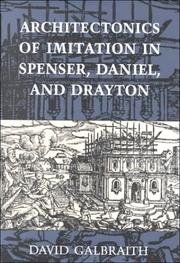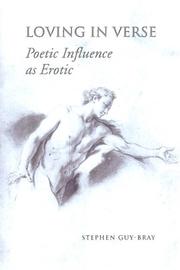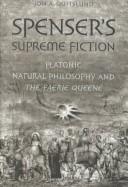| Listing 1 - 10 of 12 | << page >> |
Sort by
|
Book
ISBN: 1526121042 1526107848 9781526107831 152610783X 9781526107848 9780719083846 9781526139504 0719083842 1526139502 9781526121042 Year: 2016 Publisher: Manchester
Abstract | Keywords | Export | Availability | Bookmark
 Loading...
Loading...Choose an application
- Reference Manager
- EndNote
- RefWorks (Direct export to RefWorks)
This is a critical analysis of the importance and influence of Elizabethan biblical typology on Spenser and the composition of The Faerie Queene.
Spenser, Edmund, --- English poetry --- Literature and literary studies. --- Literature: history and criticism. --- LITERARY CRITICISM / European / English, Irish, Scottish, Welsh. --- Europe --- History and criticism. --- Western Europe --- Ireland. --- English literature --- Allegory. --- Bible. --- Edmund Spenser. --- Sermons. --- The Faerie Queene.
Book
ISBN: 0823257177 0823260836 0823257150 0823257142 1322965048 Year: 2014 Publisher: New York : Fordham University Press,
Abstract | Keywords | Export | Availability | Bookmark
 Loading...
Loading...Choose an application
- Reference Manager
- EndNote
- RefWorks (Direct export to RefWorks)
Becoming Christian argues that romance narratives of Jews and Muslims converting to Christianity register theological formations of race in post-Reformation England. The medieval motif of infidel conversion came under scrutiny as Protestant theology radically reconfigured how individuals acquire religious identities. Whereas Catholicism had asserted that Christian identity begins with baptism, numerous theologians in the Church of England denied the necessity of baptism and instead treated Christian identity as a racial characteristic passed from parents to their children. The church thereby developed a theology that both transformed a nation into a Christian race and created skepticism about the possibility of conversion. Race became a matter of salvation and damnation. Britton intervenes in critical debates about the intersections of race and religion, as well as in discussions of the social implications of romance. Examining English translations of Calvin, treatises on the sacraments, catechisms, and sermons alongside works by Edmund Spenser, John Harrington, William Shakespeare, John Fletcher, and Phillip Massinger, Becoming Christian demonstrates how a theology of race altered a nation’s imagination and literary landscape.
English literature --- Religion and literature --- Conversion in literature. --- Christians in literature. --- History and criticism. --- History --- Baptism. --- Church of England. --- Edmund Spenser. --- English literature. --- Jews. --- Muslims. --- Race. --- Romance. --- William Shakespeare. --- conversion.
Book
ISBN: 9781526113252 1526113252 9781526113245 1526113244 9781526113269 1526113260 Year: 2017 Publisher: Manchester
Abstract | Keywords | Export | Availability | Bookmark
 Loading...
Loading...Choose an application
- Reference Manager
- EndNote
- RefWorks (Direct export to RefWorks)
"This volume interrogates the notion of a literary 'Renaissance' in Dublin, arguing that the associated cultural pursuits were already well developed in late-medieval Ireland. It covers new ground through detailed case studies of print and literature, providing quantitative analysis of print production in Ireland, as well as unique insights into the city's literary communities and considerations of literary genres that flourished there. The chapters address a wider range of topics than much of the existing scholarly literature, including English and European influences, the construction of Dublin literary identities, early modern reading habits and non-Anglophone contexts. The Renaissance in Dublin was marked by people, places and discourses that emerged and re-emerged with unexpected frequency, resulting in the cohesive view of the re-birth of literary activity in Dublin that is captured in this volume. Featuring contributions from leading scholars of early modern Ireland, including Raymond Gillespie, Alexander S. Wilkinson, Marie-Louise Coolahan and Andrew Hadfield, Dublin: Renaissance city of literature is an invaluable resource for understating the factors that contributed to the complex literary character of the city."--
English literature --- Renaissance --- Irish authors --- History and criticism. --- Ireland --- Anglo-Irish drama. --- Edmund Spenser. --- Gaelic poetry. --- Henry Burnell. --- James Shirley. --- James Ware. --- James Yonge. --- Latin orations. --- Memoriale. --- Renaissance Dublin. --- Richard Bellings. --- late Elizabethan Dublin. --- literary Renaissance. --- literary authorship.
Book
ISBN: 0823280667 0823277941 Year: 2018 Publisher: New York, NY : Fordham University Press,
Abstract | Keywords | Export | Availability | Bookmark
 Loading...
Loading...Choose an application
- Reference Manager
- EndNote
- RefWorks (Direct export to RefWorks)
Indecorous Thinking is a study of artifice at its most conspicuous: it argues that early modern writers turned to figures of speech like simile, antithesis, and periphrasis as the instruments of a particular kind of thinking unique to the emergent field of vernacular poesie. The classical ideal of decorum described the absence of visible art as a precondition for rhetoric, civics, and beauty: speaking well meant speaking as if off-the-cuff. Against this ideal, Rosenfeld argues that one of early modern literature's richest contributions to poetics is the idea that indecorous art—artifice that rings out with the bells and whistles of ornamentation—celebrates the craft of poetry even as it expands poetry’s range of activities. Rosenfeld details a lost legacy of humanism that contributes to contemporary debates over literary studies’ singular but deeply ambivalent commitment to form. Form, she argues, must be reexamined through the legacy of figure. Reading poetry by Philip Sidney, Edmund Spenser, and Mary Wroth alongside pedagogical debates of the period and the emergence of empiricism, with its signature commitment to the plain style, Rosenfeld offers a robust account of the triumphs and embarrassments that attended the conspicuous display of artifice. Drawing widely across the arts of rhetoric, dialectic, and poetics, Indecorous Thinking offers a defense of the epistemological value of form: not as a sign of the aesthetic but as the source of a particular kind of knowledge we might call poetic.
English language --- Figures of speech --- Figures of speech in literature. --- English poetry --- Rhetoric. --- Early works to 1800. --- History and criticism. --- Decorum. --- Edmund Spenser. --- Eloquence. --- Epistemology. --- Figures of Speech. --- Form. --- Mary Wroth. --- Philip Sidney. --- Style. --- rhetoric.
Book
ISBN: 9781526125132 9781526107855 1526107856 1526125137 1526121077 9780719088087 0719088089 9781526121073 9781526107862 1526107864 1526139510 Year: 2017 Publisher: Manchester, UK : Manchester University Press,
Abstract | Keywords | Export | Availability | Bookmark
 Loading...
Loading...Choose an application
- Reference Manager
- EndNote
- RefWorks (Direct export to RefWorks)
This is a detailed study of Spenser's poetic legacy, focusing on his reputation as a satirist and his influence on satirical poetry written by his contemporaries.
Satire, English. --- Satire, English --- History and criticism. --- Spenser, Edmund, --- Criticism and interpretation. --- English satire --- English wit and humor --- Literature --- Literary criticism --- Renaissance --- European Literature --- Spenser --- Satire --- Allegory --- Edmund Spenser --- The Shepheardes Calender --- Thomas Nashe --- Literary Studies: C 1500 To C 1800 --- LITERARY CRITICISM / European / General --- Literary studies: c 1400 to c 1600

ISBN: 9786612037115 1282037110 1442670940 9781442670945 9780802044518 0802044514 6612037113 9781282037113 Year: 2000 Publisher: Toronto, [Ontario] ; Buffalo, [New York] ; London, [England] : University of Toronto Press,
Abstract | Keywords | Export | Availability | Bookmark
 Loading...
Loading...Choose an application
- Reference Manager
- EndNote
- RefWorks (Direct export to RefWorks)
Exploring the boundaries between poetry and history on three of England's epic literary works, Galbraith argues that they enter into a dialogue with classical and contemporary predecessors with implications for understanding the English Renaissance.
English poetry --- Literature and history --- Historical poetry, English --- History and criticism. --- History --- Spenser, Edmund, --- Epic poetry, English --- Epic poetry, Latin --- Imitation in literature. --- Renaissance --- History and criticism --- Roman influences. --- Appreciation --- Faerie queene (Spenser, Edmund) --- England. --- Edmund Spenser, The Faerie queene (Spenser, Edmund) --- Faerie queen (Spenser, Edmund) --- Faery queen (Spenser, Edmund) --- Angleterre --- Anglii͡ --- Anglija --- Engeland --- Inghilterra --- Inglaterra
Book
ISBN: 1526119889 1526103885 9781526103895 1526103893 9781526103888 9781526101174 1526101173 9781526119889 Year: 2016 Publisher: Manchester
Abstract | Keywords | Export | Availability | Bookmark
 Loading...
Loading...Choose an application
- Reference Manager
- EndNote
- RefWorks (Direct export to RefWorks)
Dubbed 'the English Virgil' in his own lifetime, Spenser has been compared to the Augustan laureate ever since. He invited the comparison, expecting a readership intimately familiar with Virgil's works to notice and interpret his rich web of allusion and imitation, but also his significant departures and transformations.This volume considers Spenser's pastoral poetry, the genre which announces the inception of a Virgilian career in The Shepheardes Calender, and to which he returns in Colin Clouts Come Home Againe, throwing the 'Virgilian career' into reverse. His sustained dialogue with Virgil's Eclogues bewrays at once a profound debt to Virgil and a deep-seated unease with his values and priorities, not least his subordination of pastoral to epic. Drawing on the commentary tradition and engaging with current critical debates, this study of Spenser's interpretation, imitation and revision of Virgil casts new light on both poets-and on the genre of pastoral itself.
Pastoral poetry, English --- History and criticism. --- Virgil --- Spenser, Edmund, --- Influence --- Criticism and interpretation. --- Pastoral poetry, English. --- Literature --- Literature & Literary Studies --- LITERARY CRITICISM / European / General --- Biography, Literature & Literary studies --- English pastoral poetry --- English poetry --- Colin Clouts Come Home Againe. --- Eclogues. --- Edmund Spenser. --- Renaissance. --- Servius. --- The Shepheardes Calender. --- Virgilian career. --- pastoral poetry. --- poetic programme. --- the English Virgil.

ISBN: 1281992127 9786611992125 1442676841 0802092039 0802080456 9781442676848 9780802092038 9781281992123 Year: 2006 Publisher: Toronto University of Toronto Press
Abstract | Keywords | Export | Availability | Bookmark
 Loading...
Loading...Choose an application
- Reference Manager
- EndNote
- RefWorks (Direct export to RefWorks)
Using concepts from queer theory and close readings of images and allusions in these texts, Loving in Verse demonstrates the importance of homoeroticism to an examination of poetic influence. A discussion of the theories of poetic influence from four twentieth-century writers (T.S. Eliot, Harold Bloom, Roland Barthes, and Frank O'Hara) concludes Guy-Bray's analysis."--Jacket. "Loving in Verse examines how three poets present their relationship to their most important predecessors, beginning with Dante's use of Virgil and Statius in the Divine Comedy, moving on to Spenser's use of medieval English poets in the Faerie Queene, and finally addressing Hart Crane's use of Whitman in The Bridge. In each case, Guy-Bray shows how the younger poet presents himself and the older poet as part of a male couple. He goes on to demonstrate how male couples are, in fact, found throughout these poems, and while some are indeed familial or hostile, many are romantic or sexual.
LITERARY CRITICISM --- Poetry --- Homosexuality in literature --- Literature - General --- Languages & Literatures --- History and criticism --- Homosexuality in literature. --- Poetry. --- Dante Alighieri, --- Spenser, Edmund, --- Crane, Hart, --- History and criticism. --- Criticism --- Poems --- Verses (Poetry) --- Literature --- Philosophy --- Faerie queene (Spenser, Edmund) --- Divina commedia (Dante Alighieri) --- Bridge (Crane, Hart) --- Cumégia (Dante Alighieri) --- Divine comedy (Dante Alighieri) --- Divina comedia (Dante Alighieri) --- Commedia (Dante Alighieri) --- Comedy (Dante Alighieri) --- Poema sacro (Dante Alighieri) --- Comedia (Dante Alighieri) --- Edmund Spenser, The Faerie queene (Spenser, Edmund) --- Faerie queen (Spenser, Edmund) --- Faery queen (Spenser, Edmund)

ISBN: 1282014285 9786612014284 1442680113 9781442680111 0802035051 9780802035059 Year: 2001 Publisher: Toronto, [Ontario] ; Buffalo, [New York] ; London, [England] : University of Toronto Press,
Abstract | Keywords | Export | Availability | Bookmark
 Loading...
Loading...Choose an application
- Reference Manager
- EndNote
- RefWorks (Direct export to RefWorks)
Quitslund argues that Spenser sought authority for his poem by grounding its narrative in a divinely ordained natural order, intelligible in terms derived from the ancient sources of poetry and philosophy.
English poetry --- Philosophy of nature in literature. --- Neoplatonism in literature. --- Greek influences. --- Spenser, Edmund, --- Plato --- Immerito, --- Spencer, Edmund, --- Spenser, Edmond, --- Platon --- Aflāṭūn --- Aplaton --- Bolatu --- Platonas --- Platone --- Po-la-tʻu --- Pʻŭllatʻo --- Pʻŭllatʻon --- Pʻuratʻon --- Πλάτων --- אפלטון --- פלאטא --- פלאטאן --- פלאטו --- أفلاطون --- 柏拉圖 --- 플라톤 --- Платон --- プラトン --- Philosophy. --- Influence. --- Faerie queene (Spenser, Edmund) --- Edmund Spenser, The Faerie queene (Spenser, Edmund) --- Faerie queen (Spenser, Edmund) --- Faery queen (Spenser, Edmund)
Book
ISBN: 1526111470 9781526111470 9781526111463 1526111462 9780719087714 9781526106957 Year: 2013 Publisher: Manchester ; New York Manchester University Press
Abstract | Keywords | Export | Availability | Bookmark
 Loading...
Loading...Choose an application
- Reference Manager
- EndNote
- RefWorks (Direct export to RefWorks)
This collection of essays covers a wide range of topics about Ralegh's diversified career and achievements. The essays shed light on less familiar facets such as Ralegh as a father and his representation in the Arts; others re-examine him as poet, historian, and figure of controversy.
Raleigh, Walter, --- Spenser, Edmund, --- Immerito, --- Spencer, Edmund, --- Spenser, Edmond, --- R., W. --- Ralegh, Walter, --- Raleĭ, Uolter, --- Rauleigh, Walter, --- Rawleigh, Walter, --- Rawley, Walter, --- W. R. --- Friends and associates. --- Literature --- Literary Studies: C 1500 To C 1800 --- LITERARY CRITICISM / Renaissance --- Literary studies: c 1400 to c 1600 --- Cynthia holograph. --- Edmund Spenser. --- Elizabeth's reign. --- Ireland. --- Sir Walter Raleigh's poem. --- The Nymph's Reply. --- disputed authorship. --- literary legacy. --- mutability. --- patrilineal imperatives. --- sovereignty.
| Listing 1 - 10 of 12 | << page >> |
Sort by
|

 Search
Search Feedback
Feedback About UniCat
About UniCat  Help
Help News
News